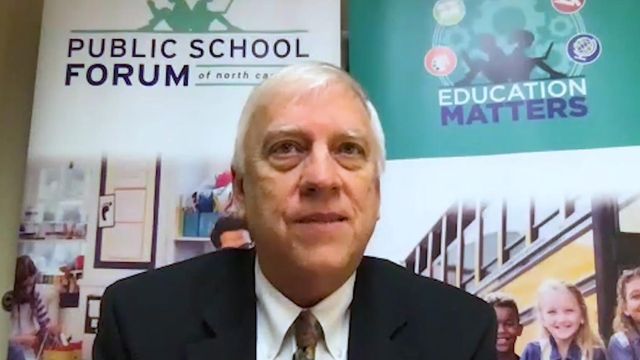Gov. Cooper signs orders to help students access remote learning as COVID-19 spreads
Gov. Roy Cooper signed two executive orders this week that will make it easier for students to access remote learning as the state continues to struggle with the spread of COVID-19.
Posted — UpdatedOn March 30, 2020, he signed Executive Order 122, which allows donation or transfer of state surplus property to help state agencies, local governments, and schools in response to the COVID-19 pandemic.
School-related items included in the order are “computers and other items which may be useful in facilitating the ability to participate in distance education opportunities.”
The North Carolina Association of Educators applauded the move in an emailed statement.
“By urging all cable and Internet providers not to disconnect subscribers while COVID-19 infections continue to necessitate distance learning and telecommuting, Governor Cooper took the necessary steps to allow for people to work and learn from home, regardless of individual circumstances,” said Mark Jewell, president of the North Carolina Association of Educators, in the statement.
“NCAE applauds the governor’s continued leadership on issues of health, safety, and access to education during this challenging time, and we look forward to working with the governor and other state lawmakers to continue to react to this pandemic in as caring and humane a manner as possible.”
Cooper also said during the press conference that there still isn’t enough information for him to say whether or not schools will reopen on May 15.
“That was the earliest period that we thought this could happen,” he said. “Certainly we are not taking that date off the table yet.”
He said that as more information about COVID-19 and its spread becomes available, the state will make a decision about whether schools will reopen then or not.
“I want to go back, but we want to make sure that it’s safe for our children and that it’s safe for us as we approach this new normal in North Carolina … right now, we just don’t know yet,” he said.
On March 30 at 5 p.m., the governor’s stay-at-home order went into effect, limiting gatherings to 10 people or fewer and closing businesses not deemed essential. People are only to leave the house to visit essential businesses, exercise outside, or help family members. Cooper reiterated during the press conference that it’s important that people adhere to the stay-at-home order.
“I know it’s hard, but prevention is still the single most important thing you can do right now,” he said.
Earlier this month, Supreme Court Chief Justice Cheri Beasley announced that eviction notices should not be served for the time being. At the press conference, Cooper also urged the delay of any evictions already entered into the court system.
Cooper said he has also called up additional National Guard members to active duty to help get supplies out and to do engineering assessments in case alternative hospitals are needed to battle COVID-19.
He said the state is pushing for more medical supplies. As of yesterday, the state had received 17.6% of the supplies asked for from the strategic national supply.
“That’s not enough,” he said.
Cooper pointed out that families on federal food assistance get that monthly assistance on April 1, and that people should be aware of that and only buy the food supplies they need.
“If we all do our part, we’ll get through these times,” he said. “The decisions we’re making to battle this invisible enemy have not been easy. But they’re necessary to save lives.”
Mandy Cohen, the secretary of the state Department of Health and Human Services, gave a number of statistics on COVID-19’s spread and said more will be forthcoming in the days ahead.
There are 1,498 confirmed cases in 77 counties in North Carolina. The median age of those affected is 47. One hundred and fifty seven people are hospitalized, and there have been eight deaths.
She said the state has about 17,000 hospital beds, 7,000 of which are empty. There are 3,000 intensive care unit beds, 793 of which are empty. That data is based on about 84% of hospitals reporting, and doesn’t include surge patient capacity being built by the state.
“Our goal really is transparency. We continue to find the right balance between expediency and accuracy,” Cohen said. “And if someone could find a few more hours in the day, that would help us too.”
President Donald Trump also announced over the weekend that social distancing guidelines should remain in place until at least the end of April. That means Americans should avoid unneeded travel, going to restaurants, or gathering in groups of 10 or more, among other things.
Related Topics
• Credits
Copyright 2024 EducationNC. All rights reserved.






